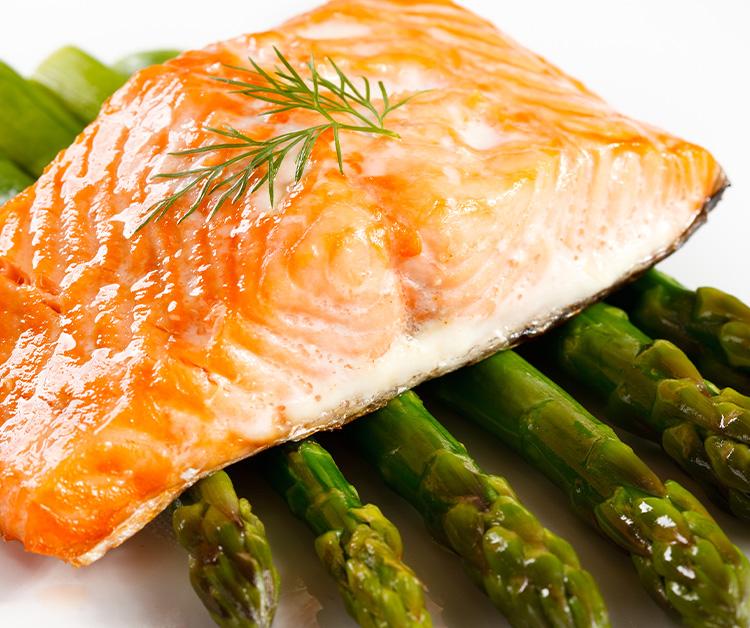
Learn how to make this delicious recipe for salmon during pregnancy, packed with nutrients to help support a healthy baby.
| Ingredients | |
|---|---|
| Salmon | |
| 2 | wild salmon fillets (about 1½ pounds total) |
| salt and ground black pepper | |
| 4 tablespoons | grainy mustard |
| 6 tablespoons | brown sugar |
| Grilled Pineapple | |
| 1 tablespoon | extra virgin olive oil |
| ¼ teaspoon | ground cloves |
| 1 teaspoon | ground cinnamon |
| 2 tablespoons | honey |
| 1 tablespoon | lime juice |
| 1 | ripe pineapple |
| 1 teaspoon | rum extract |
| 1 tablespoon | freshly grated lime zest |
| Grilled Asparagus | |
| 1 pound | asparagus, tough ends trimmed |
| 1½ tablespoons | extra virgin olive oil |
| salt and ground black pepper |
| NUTRITION (Per Serving) | |
|---|---|
| CALORIES | 596.9 cal |
| FAT | 23.2 g |
| SATURATED FAT | 3.4 g |
| SODIUM | 566.6 mg |
| CARBOHYDRATES | 52.8 g |
| TOTAL SUGARS | 44.2 g |
| DIETARY FIBER | 5.1 g |
| PROTEIN | 47 g |
| BIOTIN | 9.3 mcg |
| CALCIUM | 105.1 mg |
| CHLORIDE | ----- |
| CHOLESTEROL | 120.8 mg |
| CHOLINE | 28 mg |
| CHROMIUM | 0.8 mcg |
| COPPER | 0.9 mg |
| FOLATE | 127.8 mcg |
| IODINE | ----- |
| IRON | 4.9 mg |
| MAGNESIUM | 104.4 mg |
| MANGANESE | 1.8 mg |
| NIACIN | 18.9 mg |
| OMEGA-3 FATTY ACIDS | 4.8 g |
| OMEGA-6 FATTY ACIDS | 1.9 g |
| PANTOTHENIC ACID | 3.9 mg |
| PHOSPHORUS | 517.1 mg |
| POTASSIUM | 1486.5 mg |
| RIBOFLAVIN | 1.0 mg |
| SELENIUM | 87.4 mcg |
| THIAMIN | 0.8 mg |
| VITAMIN A | 925 IU |
| VITAMIN B6 | 1.9 mg |
| VITAMIN B12 | 5.2 mcg |
| VITAMIN C | 73.9 mg |
| VITAMIN D | 476.3 IU |
| VITAMIN E | 4.6 mg |
| VITAMIN K | 48.7 mcg |
| ZINC | 2.3 mg |
All information on Enfamil, including but not limited to information about health, medical conditions, and nutrition, is intended for your general knowledge and is not a substitute for a healthcare professional's medical identification, advice, or management for specific medical conditions. You should seek medical care and consult your doctor or pediatrician for any specific health or nutrition issues. Never disregard professional medical advice or delay seeking medical treatment, care, or help because of information you have read on Enfamil.